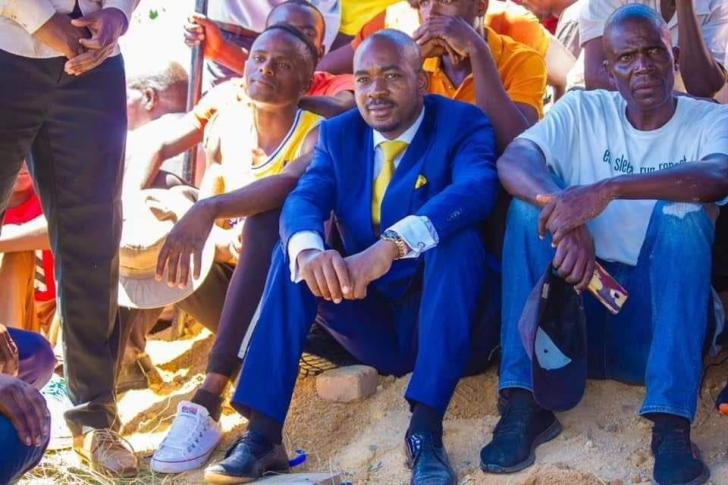News / National
Chamisa bounces back to active politics
27 Sep 2024 at 13:13hrs |
0 Views

Former Citizens Coalition for Change (CCC) leader Nelson Chamisa has revealed plans for a new governance model, marking a departure from traditional opposition politics. This comes months after his resignation from CCC in January, citing Zanu-PF infiltration within the party.
In an exclusive interview with The Zimbabwe Independent, Chamisa outlined a vision for a governance framework that embraces the diverse views of all Zimbabweans, irrespective of political affiliation.
"The first thing we have to fix is the politics," Chamisa said.
"We fix politics by ensuring we have a governance framework for everyone - Zanu-PF members, opposition members, and everyone else."
Chamisa emphasized the importance of synthesis in governance, combining dominant and alternative views for national progress.
"Any society is built on synthesis. There is a thesis, the dominant opinion, and an antithesis, the alternative opinion. But there must be a government that is a synthesis, combining both."
He expressed concern that Zimbabwe lacks a unifying force that integrates various perspectives.
"We do not have that uniting agent, the government must be the melting pot for society to move the country forward. This is not a zero-sum game," Chamisa argued, stressing the need for collaborative governance.
Plans for Industrial Development and Citizen-Focused Governance
Looking ahead to the 2028 elections, Chamisa outlined a manpower and industrial development strategy aimed at identifying key industries for growth and creating jobs.
"We need proper manpower planning and industrial expansion to determine which industries are our cash cows, where we can have quick wins, and how many jobs will be created," he said.
Chamisa also spoke of leveraging Zimbabwe's resources for international markets.
In a bid to make governance more responsive to public concerns, Chamisa proposed establishing a Citizens Affairs Department. This department would handle citizen grievances and conduct regular satisfaction surveys to assess government performance.
"From day one, we must know what each citizen needs - education, jobs, social welfare, and access to resources like land and ownership," he added.
Calls for Autonomy in Higher Education
Chamisa also proposed reforms in Zimbabwe's higher education system, advocating for universities to be free from presidential control. He argued that tertiary institutions should be run by professionals and industry experts, rather than being tied to political figures.
"This idea of the president presiding over graduations is antiquated," Chamisa remarked, calling for independence and autonomy in universities.
The former opposition leader's bold vision reflects a shift toward inclusive governance and development-focused policies as he positions himself for a potential run in the 2028 presidential elections.
Chamisa's new governance model aims to reshape the political landscape by fostering unity, addressing citizens' needs, and promoting a collaborative approach to leadership.
In an exclusive interview with The Zimbabwe Independent, Chamisa outlined a vision for a governance framework that embraces the diverse views of all Zimbabweans, irrespective of political affiliation.
"The first thing we have to fix is the politics," Chamisa said.
"We fix politics by ensuring we have a governance framework for everyone - Zanu-PF members, opposition members, and everyone else."
Chamisa emphasized the importance of synthesis in governance, combining dominant and alternative views for national progress.
"Any society is built on synthesis. There is a thesis, the dominant opinion, and an antithesis, the alternative opinion. But there must be a government that is a synthesis, combining both."
He expressed concern that Zimbabwe lacks a unifying force that integrates various perspectives.
"We do not have that uniting agent, the government must be the melting pot for society to move the country forward. This is not a zero-sum game," Chamisa argued, stressing the need for collaborative governance.
Plans for Industrial Development and Citizen-Focused Governance
Looking ahead to the 2028 elections, Chamisa outlined a manpower and industrial development strategy aimed at identifying key industries for growth and creating jobs.
"We need proper manpower planning and industrial expansion to determine which industries are our cash cows, where we can have quick wins, and how many jobs will be created," he said.
Chamisa also spoke of leveraging Zimbabwe's resources for international markets.
In a bid to make governance more responsive to public concerns, Chamisa proposed establishing a Citizens Affairs Department. This department would handle citizen grievances and conduct regular satisfaction surveys to assess government performance.
"From day one, we must know what each citizen needs - education, jobs, social welfare, and access to resources like land and ownership," he added.
Calls for Autonomy in Higher Education
Chamisa also proposed reforms in Zimbabwe's higher education system, advocating for universities to be free from presidential control. He argued that tertiary institutions should be run by professionals and industry experts, rather than being tied to political figures.
"This idea of the president presiding over graduations is antiquated," Chamisa remarked, calling for independence and autonomy in universities.
The former opposition leader's bold vision reflects a shift toward inclusive governance and development-focused policies as he positions himself for a potential run in the 2028 presidential elections.
Chamisa's new governance model aims to reshape the political landscape by fostering unity, addressing citizens' needs, and promoting a collaborative approach to leadership.
Source - the independent
Join the discussion
Loading comments…
































